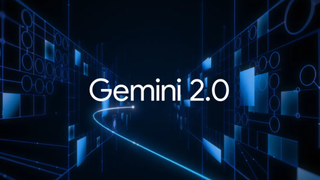Google unveils Gemini 2.0 Flash Thinking — its answer to OpenAI's o1
Google joins the big boys AI reasoning club with a bang

Google has just unveiled Gemini 2.0 Flash Thinking, an AI model that combines the speed of its Flash technology with the same kind of chain of thought reasoning of OpenAI’s o1 model. The new model is available to everyone right now on Google’s AI Studio platform, free of charge.
This free version comes with a token limit of 32,767 tokens, so it’s somewhat limited compared to other Gemini models, but what’s remarkable is how fast it deals with complicated problems that typically stump conventional AI models.
The launch demos include riddles, probability problems and other examples needing complex thought. It’s not perfect, some of the examples from members of the public show it can still make mistakes, and miss key aspects of some problem prompts.
However considering that this release is no more than a few hours old, it’s once again an impressive demonstration of what the DeepMind AI architecture can deliver.
What is Gemini 2.0 Flash Thinking
Breaking news from Chatbot Arena⚡🤔@GoogleDeepMind's Gemini-2.0-Flash-Thinking debuts as #1 across ALL categories!The leap from Gemini-2.0-Flash:- Overall: #3 → #1- Overall (Style Control): #4 → #1- Math: #2 → #1- Creative Writing: #2 → #1- Hard Prompts: #1 → #1… https://t.co/lO1DiTiOOj pic.twitter.com/cq2MRMbWZ1December 19, 2024
One of the key differences with OpenAI’s approach is the fact that Gemini 2.0 Flash Thinking displays its reasoning as it goes, while o1 is much more bashful and hides its thoughts away. This is an important distinction for those who need to follow along to ensure no hallucinations are happening in very long thought chains.
The new model already leapt to the number one spot in the Lmarena Chatbot Arena. That is a spectacular result for a model this new, in such a short period of time. I tested Flash Thinking with a riddle cheekily lifted from the OpenAI community 50 Really Hard Riddles web page, and it managed to nail the answer in 9.2 seconds. While this is not the kind of test that will prove anything meaningful, it's a fairly decent example of how competent this model seems to be.
The other main difference between Google’s new reasoning model and OpenAI is the fact that Google AI Studio allows you to adjust safety settings to check for different responses. So for instance you can tweak harassment, hate, dangerous and explicit content and see how those changes affect the model’s reasoning abilities.
Sign up to get the BEST of Tom's Guide direct to your inbox.
Get instant access to breaking news, the hottest reviews, great deals and helpful tips.
It’s still too early to definitively state an opinion one way or the other on this new model. However first indications are that Google has once again stepped up to the plate and delivered a smashing vindication of its core AI technology and abilities.
Those interested in trying out the new model for free can sign up on Google’s AI Studio platform, and select it from the model box in the right-hand sidebar.
More from Tom's Guide
- OpenAI announces '12 days of OpenAI' with a new product or model every day
- I just saw the future of gaming — Google's Genie 2 can turn text into a playable game in real-time
- ElevenLabs drops new conversational AI — it’s as natural as chatting to a human

Nigel Powell is an author, columnist, and consultant with over 30 years of experience in the technology industry. He produced the weekly Don't Panic technology column in the Sunday Times newspaper for 16 years and is the author of the Sunday Times book of Computer Answers, published by Harper Collins. He has been a technology pundit on Sky Television's Global Village program and a regular contributor to BBC Radio Five's Men's Hour.
He has an Honours degree in law (LLB) and a Master's Degree in Business Administration (MBA), and his work has made him an expert in all things software, AI, security, privacy, mobile, and other tech innovations. Nigel currently lives in West London and enjoys spending time meditating and listening to music.









